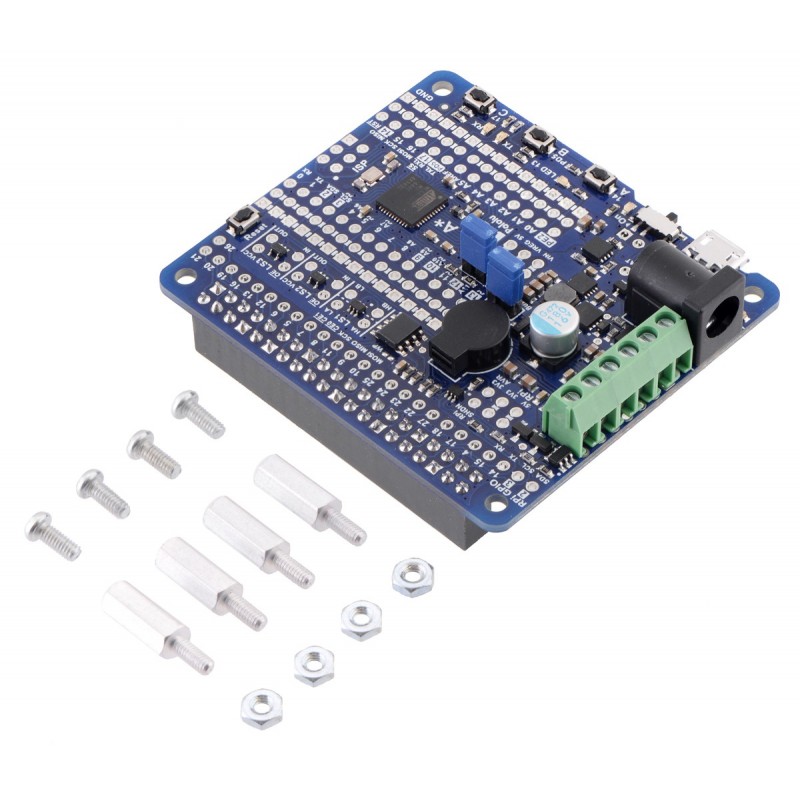












180,39 zł Netto
Programowalny moduł sterownika do robota, mogący pracować samodzielnie lub pod kontrolą Raspberry PI. Moduł opiera się na mikrokontrolerze Atmel ATmega32U4, posiada złącze USB i wgrany bootloader kompatybilny z Arduino. Pololu - 3117
A-Star 32U4 Robot Controller LV with Raspberry Pi Bridge to zaawansowany kontroler robota, który może pracować samodzielnie lub jako rozszerzenie (HAT) dla Raspberry Pi. Płytka łączy mikrokontroler ATmega32U4 (zgodny z Arduino) z dwoma sterownikami silników DC, umożliwiając budowę kompaktowych i wydajnych robotów mobilnych.
W typowej konfiguracji Raspberry Pi realizuje zadania wysokopoziomowe (Linux, sieć, wizja), a A-Star przejmuje zadania czasu rzeczywistego: sterowanie silnikami, PWM, obsługę czujników analogowych czy serwomechanizmów. Dzięki wbudowanym konwerterom poziomów logicznych oraz zasilaniu 5 V dla Raspberry Pi, integracja jest szybka i bezpieczna.
Producent BTC Korporacja sp. z o. o. Lwowska 5 05-120 Legionowo Polska sprzedaz@kamami.pl 22 767 36 20
Osoba odpowiedzialna BTC Korporacja sp. z o. o. Lwowska 5 05-120 Legionowo Polska sprzedaz@kamami.pl 22 767 36 20
Komputer Raspberry Pi 3 model B (Quad Core Broadcom BCM2837, 4x1.2GHz rdzeń ARM Cortex-A53, RAM 1GB, 4xUSB, Ethernet, HDMI, Wifi, Bluetooth)
Brak towaru
Komputer Raspberry Pi 3 model B+ (Quad Core Broadcom BCM2837B0, 4x1.4GHz rdzeń ARM Cortex-A53, RAM 1GB, 4xUSB, Ethernet, HDMI, Wi-Fi, Bluetooth BLE)
Pololu Dual G2 High-Power Motor Driver 18v18 to rozszerzenie pozwalające na sterowanie dwoma silnikami prądu stałego przeznaczone dla Raspberry Pi. Silniki mogą być zasilane napięciem 6,5-30V i pobierać maksymalnie prąd o natężeniu do 18A. Pololu 3750
Pololu Dual G2 High-Power Motor Driver 24v18 to rozszerzenie pozwalające na sterowanie dwoma silnikami prądu stałego przeznaczone dla Raspberry Pi. Silniki mogą być zasilane napięciem 6,5-36V i pobierać maksymalnie prąd o natężeniu do 18A. Pololu 3756
Brak towaru
Pololu Dual G2 High-Power Motor Driver 18v22 to rozszerzenie pozwalające na sterowanie dwoma silnikami prądu stałego przeznaczone dla Raspberry Pi. Silniki mogą być zasilane napięciem 6,5-30V i pobierać maksymalnie prąd o natężeniu do 22A. Pololu 3754
Brak towaru
Dual MAX14870 Motor Driver to podwójny sterownik silników DC kompatybilny z Raspberry Pi pozwalający na wysterowanie dwóch silników DC napięciem 4,5-36V prądem ciągłym 1,7A. Pololu 3759
Dual MAX14870 Motor Driver to podwójny sterownik silników DC kompatybilny ze standardem Raspberry Pi pozwalający na wysterowanie dwóch silników DC napięciem 4,5-36V prądem ciągłym 1,7A. Pololu 3758
Podwójny sterownik silników DC przeznaczony dla Raspberry Pi, który umożliwia zasilanie silnika napięciem w zakresie 4,5-28V i poborze prądu przy pracy ciągłej 2,6A (5A w szczycie) dwóch silników DC. Pololu 2762
Podwójny sterownik silników DC przeznaczony dla Raspberry Pi, który umożliwia zasilanie silnika napięciem w zakresie 4,5-28V i poborze prądu przy pracy ciągłej 2,6A (5A w szczycie) dwóch silników DC. Zestaw do samodzielnego montażu. Pololu 2761
Nakładka ze sterownikiem silników TB6612FNG oraz sterownikiem PWM PCA9685 przeznaczona do minikomputerów Raspberry Pi. Płytka wyposażona została w złącze 40-pin charakterystyczne dla Raspberry Pi. Waveshare Motor Driver HAT
Brak towaru
DFRobot 0592 jest to moduł dwukanałowego sterownika silnika prądu stałego dla Raspberry Pi z interfejsem wbudowanego enkodera, która może napędzać silnik prądu stałego i silnik prądu stałego z enkoderem. DFRobot 0592
HAT z dwukanałowym sterownikiem silników DC dla Raspberry Pi. Ma napięcie pracy od 6 do 24 V i prąd ciągły do 10 A. Może być sterowany sygnałem PWM lub za pomocą wbudowanych przycisków. Cytron HAT-MDD10
Moduł z 16-kanałowym sterownikiem serwomechanizmów PCA9685 przeznaczony dla minikomputerów Raspberry Pi. Płytka wyposażona jest w złącze zasilające USB Typ C. SparkFun DEV-15316
Moduł rozszerzeń dla Raspberry Pi. Umożliwia sterowanie dwoma silnikami DC, obsługę enkoderów, 4 serwomechanizmów, IMU 9DoF oraz podłączenie modułów Qwiic. SparkFun ROB-16328
Brak towaru
Moduł HAT ze sterownikiem silników TB6612FNG oraz sterownikiem PWM PCA9685 przeznaczony do minikomputerów Raspberry Pi. Płytka wyposażona została w złącza śrubowe. Adafruit 4280
Moduł z 2-kanałowym sterownikiem silników DC TB6612FNG przeznaczony do współpracy z Raspberry Pi. Może pracować z napięciem od 6 do 12 V i natężeniem prądu do 3 A. SB Components 21468
Moduł z 4-kanałowym sterownikiem silników DC (2 x L293D) przeznaczony do współpracy z Raspberry Pi. Może pracować z napięciem od 6 do 24 V i natężeniem prądu do 600 mA. SB Components 08001
Oficjalny moduł rozszerzeń (HAT) dedykowany do Raspberry Pi. Pozwala na sterowanie silnikami LEGO SPIKE Prime i obsłguę czujników LEGO. Raspberry Pi SC0622

Programowalny moduł sterownika do robota, mogący pracować samodzielnie lub pod kontrolą Raspberry PI. Moduł opiera się na mikrokontrolerze Atmel ATmega32U4, posiada złącze USB i wgrany bootloader kompatybilny z Arduino. Pololu - 3117
